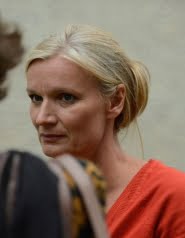
Katarina Frostenson
- Sweden
- Zu Gast beim ilb: 2005
Katarina Frostenson was born in Brännkyrka, Sweden in 1953. She studied Film, Literature and Theatre in nearby Stockholm and is currently one of the most important European poets. Her debut was in 1978, two years later she achieved fame with her next collection, »Rena land« (1980; t: Pure land). From the beginning, Frostenson’s hermetic poetry emerged with a very distinct and personal lyrical tone. It has been understood as a form of female writing which eludes any kind of convention or tradition but rather pursues entirely new paths. Indeed, she shows this streak in the very typography of her poems, which sometimes feature empty spaces and gaps, without however – as in concrete poetry – highlighting the visual effects. The words are not connected in complete sentences or arranged in specific semantic contexts, but rather combined according to their phonetic and material attributes, in which pauses in rhythm and place achieve dissonance alongside harmony. Frostenson’s German translator, Verena Reichel, refers to the special role of the vocal: »For the poet and playwright Katarina Frostenson, the voice is to all intents and purposes a strange being, which exists purely for itself. Her poems conduct their own kind of speech. The articulation with sound profile, tempo and rhythm, pauses in between, the bracing and relifting, acquires a special role as poetic medium.« The poems deny their signifying function even on the level of emotions, as the poet points out: »When I write, I have a strong, almost overwhelming feeling that all the order comes from the outer reality and no longer from within.« In the Nineties Frostenson began to use less abrupt sentence fragmentation and increasingly employed references to legends, myths and songs. In 1994 her volume of poetry »Tankarna« (t: Repositories/Musings) appeared. Word sequences, above all from the realm of meaning of nature and the body, produced fascinating and sometimes unsettling effects.
In her genuinely lyrical way of composing, Frostenson developed the mode of »Monodramas«, a monologue-like word collage for stage and radio. She has recently written lyrical plays alongside her lyrical prose. In »Sal P« (1995; t: Hall P) – the title alludes to the famous Parisian psychiatric clinic »Salpetrière« – she deals with the (male) discovery of (female) hysteria. In 1998 her opera »Staden« (t: The city), with music by Sven-David Sandström, was performed. Frostenson, who also translates from the French (among others, Duras and Bataille), was awarded the Bellman Prize for her work in 1994, and the Henrik Steffens Prize from the Alfred Toepfer Foundation in 2004. In 1992 she was elected to the Swedish Academy, becoming the youngest member and only the fifth woman among them. She lives in Sweden.
© international literature festival berlin
Tankarna
Wahlström & Widstrand
Stockholm, 1994
Vägen till öarna
Wahlström & Widstrand
Stockholm, 1996
Staden
Wahlström & Widstrand
Stockholm, 1998
Die in den Landschaften verschwunden sind
Hanser
München, Wien, 1999
[Ü: Verena Reichel]
Korallen
Wahlström & Widstrand
Stockholm, 1999
Kristallvägen. Safirgränd
Wahlström & Widstrand
Stockholm, 2000
Endura [mit Jean-Claude Arnault]
Wahlström & Widstrand
Stockholm, 2002
Karkas
Wahlström & Widstrand
Stockholm, 2004
Übersetzer: Verena Reichel
